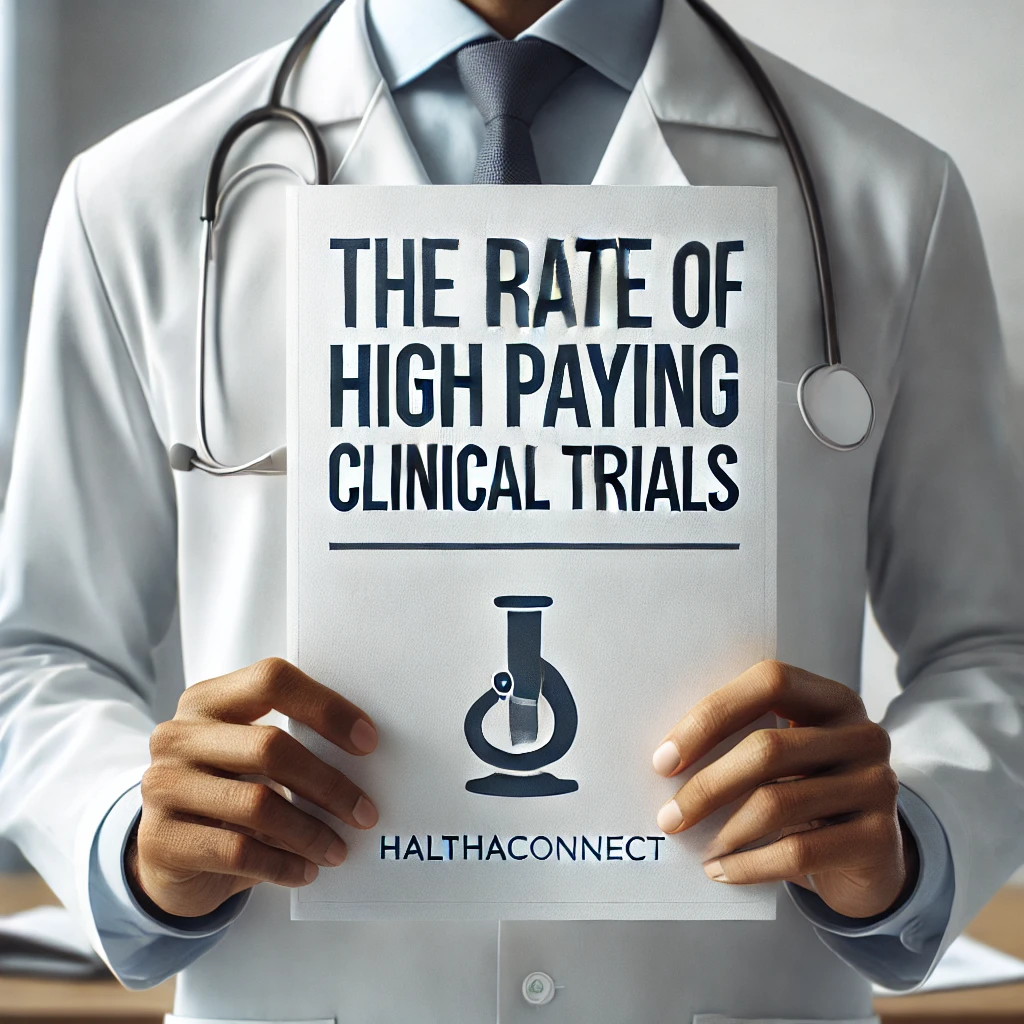Attracting many owing to the cash reward provided for participation, clinical trials have become a possible source of supplementary income in recent years. The research kind, risk level, and time commitment needed will all affect this pay-back greatly. This article seeks to list the most lucrative clinical trials and provide advice on locating these prospects so that people may make wise judgments that will aid their financial as well as medical progress.
Defining High Paying Clinical Trials
High paying clinical trials are a research project wherein participants get far more than the usual salary. Many elements influence the earning potential of a trial:
- Medical condition. Because of the particular patient group and the vital character of the study, trials with uncommon or life-threatening diseases usually pay more.
- Trial phase. Early-phase trials, especially Phase I ones, usually pay more. Generally involving first-time human trials of novel medications or equipment, these studies expose participants to more risk.
- Trial Location, duration, and risks. Trials requiring frequent visits, longer lengths of stay, or invasive procedures often pay extra to offset participants’ time, trouble, and possible adverse effects.
High-paying clinical studies combine participant engagement, medical urgency, and risk exposure. Knowing these elements will enable potential volunteers to make wise judgments about their participation in clinical research.
Why Do Some Clinical Trials Pay More?
Which clinical trials pay the most? Trials involving more danger, time investment, or inconvenience usually pay more overall. This is a breakdown:
- Early-phase trials. Phase I trials, which entail evaluating novel medications or technology in people for the first time, often pay the most, as discussed. These tests may have negative effects on participants, so their health is under great observation;
- Rare disease trials. Studies with uncommon illnesses might pay more because of the particular demands of this patient group and the difficulty in locating qualified subjects;
- Trials requiring frequent visits or invasive procedures. Trials involving regular blood draws, biopsies, or other invasive procedures usually pay extra to offset participants’ time and suffering;
- Long-term trials. Studies requiring participants to stick to a treatment plan for a longer length of time might pay more to guarantee compliance and adherence.
The tests that pay the most blend the complexity of the study with the requirements and worries of the subjects.
Factors That Determine Payment for Clinical Trials
One should be aware of the many elements influencing the degree of pay provided when contemplating involvement in clinical studies. These elements might span the particular trial phase to the sort of research and the related hazards. Particularly in high-paying medical research by Haltha, every component significantly influences the earning capacity of participants. We go to great lengths below on these important elements.
Trial Phase
Compensation amounts in a clinical study are largely influenced by its phase. Every phase has different goals and hazards connected to it:
- Phase I
A novel medication or therapy is initially tested on people here. These studies are high-risk, so pay is usually the greatest. As researchers collect vital information on safety and dose, participants are generally under careful observation for potential side effects.
- Phase II
After the first safety data is gathered, these studies focus on evaluating the effectiveness and safety of a therapy. Given less risk than Phase I studies, the pay is modest.
- Phase III
Large-scale testing on a wider population takes place in this phase to establish the efficacy of the therapy and track negative effects. Usually seen as a lesser risk, these trials pay less than previous rounds.
Type of Study
Furthermore, affecting possible revenue is the sort of clinical research. Several high paying medical studies forms consist of the following:
- Drug trials. Particularly those in Phase I, which usually pay the highest as the risk and novelty involved need to be recompensed.
- Medical device trials. These may pay substantially, especially if the gadget is intrusive or calls for constant monitoring.
- Vaccine trials. These studies may provide significant pay, given the continuous need for novel vaccinations, particularly in public health crises.
- Inpatient vs. outpatient trials. Because of the greater degree of commitment and monitoring needed, inpatient trials, which call for participants to remain at a facility, tend to spend more.
Risk Level
Risk is a critical factor in determining payment for clinical trials. Riskier studies that involve untested drugs or invasive procedures usually offer higher pay to compensate participants for their potential exposure to harm. However, ethical considerations must be taken into account when compensating participants for their risk. Researchers and sponsors must balance fair compensation with the ethical responsibility to prioritize participant safety and informed consent.
By understanding these factors, individuals can better assess what clinical trials pay the most and make informed decisions about their participation in high-paying medical studies.
Which Clinical Trials Pay the Most?
Many people are eager to discover what clinical trials pay the most when thinking about volunteering in them. Because of the hazards involved and the dedication needed from participants, some kinds of studies often provide substantial remuneration. Among the clinical studies most likely to provide significant financial benefits are these ones:
- First-in-human drug trials. Given the great danger involved in testing novel medications on human beings for the first time, these studies pay the most. Gathering first safety and effectiveness data depends on participants. Hence, their importance is great and they should be well-paid for.
- Inpatient clinical trials. Often including thorough monitoring and much testing, these studies demand volunteers to spend a significant amount of time at the research center. The need for a committed stay results in better pay to offset the time and dedication required.
- Oncology trials. Because of the importance of the diseases under study and the difficulty of the research, cancer-related studies can pay more. These studies could call for creative treatments or therapies that carry more participant involvement and risk.
Understanding these high-paying clinical trial choices helps people make wise selections about joining studies that not only provide monetary incentives but also help to significantly enhance medical research.
How to Find High Paying Medical Studies Near You
One great approach to getting additional money and supporting significant medical research in your region is to look for high-paying medical studies. These are some useful techniques to enable you to find these chances:
- Online clinical trial registries
Utilizing Internet registries and databases can significantly enhance your ability to find and participate in clinical trials. One such platform is Haltha Studies, which provides a comprehensive database of clinical studies across a wide range of medical fields. Haltha stands out by offering access to highly paid clinical studies, giving participants the opportunity to earn while contributing to valuable medical research.
- Local research institutions and hospitals
Get in touch with nearby colleges, hospitals, and research labs doing clinical studies. Many of these groups offer pertinent studies on their websites or via community outreach and have divisions specifically for clinical research.
- Clinical research companies
Visit websites run by clinical research organizations (CROs) carrying out studies on behalf of pharmaceutical firms. Usually keeping a roster of ongoing research, CROs often actively search for volunteers directly.
- Patient advocacy groups
Join specialized medical condition-related internet forums or patient advocacy organizations. These organizations may reveal which studies pay more and often exchange information regarding clinical trials.
- Social media and online platforms
Track social media websites and internet sites emphasizing research opportunities and clinical trials. Many companies utilize these outlets to promote research and find volunteers.
- Consulting with your physician
See your doctor about possible clinical studies. They may assist with the referral procedure and perhaps know of continuing research projects fit for your situation.
- Word of mouth
Network people who have taken part in clinical studies. They can tell you about studies that pay competitively and may also share their experiences.
These techniques can help you to efficiently locate highly paid medical studies close by, thereby enabling you to participate in significant research and get money benefits. Before opting to take part in any research, always keep in mind that the specifics, including time obligations and hazards, should be carefully examined.
Frequently Asked Questions (FAQs) About High Paying Clinical Trials
What Clinical Trials Pay the Most?
Given the degree of risk involved, inpatient and phase I drug studies usually pay the most. The first time a novel medicine is tried on people, phase I studies carry more risk for participants and show this in their remuneration. Inpatient studies similarly call for volunteers to spend long periods in a research center, which generates more remuneration to offset the commitment and supervision necessary.
Do All Clinical Trials Pay Well?
Although some clinical studies provide great remuneration, others might pay less based on the kind of research, phase of the trial, and degree of participation needed. Behavioral research, for example, might pay less than medication studies that are more involved. Research and evaluation of every possibility help one to grasp the possible income.
How Much Can You Earn from Clinical Trials?
Typical results from clinical studies might range greatly. For brief behavioral research, participants can get as little as $50. Long-term, high-risk studies might pay more than $10,000. The particular quantity usually corresponds with the length, complexity, and degree of risk involved in the investigation.
Can You Participate in Multiple High Paying Trials?
Although one may take part in many high-paying events, there are restrictions around timing participation. Many studies call for a pause in activity to prevent possible medication interactions or health hazards. If you are thinking of joining overlapping studies, it is important to follow the rules established by every study and speak with experts. Throughout clinical research, always give your health and safety first priority.
Conclusion
Finally, the highest paid clinical trials provide a special chance to make money and help to propel important medical advances. They are crucial for the creation of novel treatments and therapies, so involvement not only offers a possibly profitable activity but also an opportunity to be part of innovative research.
Although high-paying studies do exist, participants should give much thought to the related hazards, time commitment, and personal health issues before starting. Every trial comes with different difficulties and obligations. So, knowledge helps to guarantee a good experience. In the end, careful choices about involvement might result in financial benefits as well as the gratification of helping to advance the science of medicine toward the common good.




